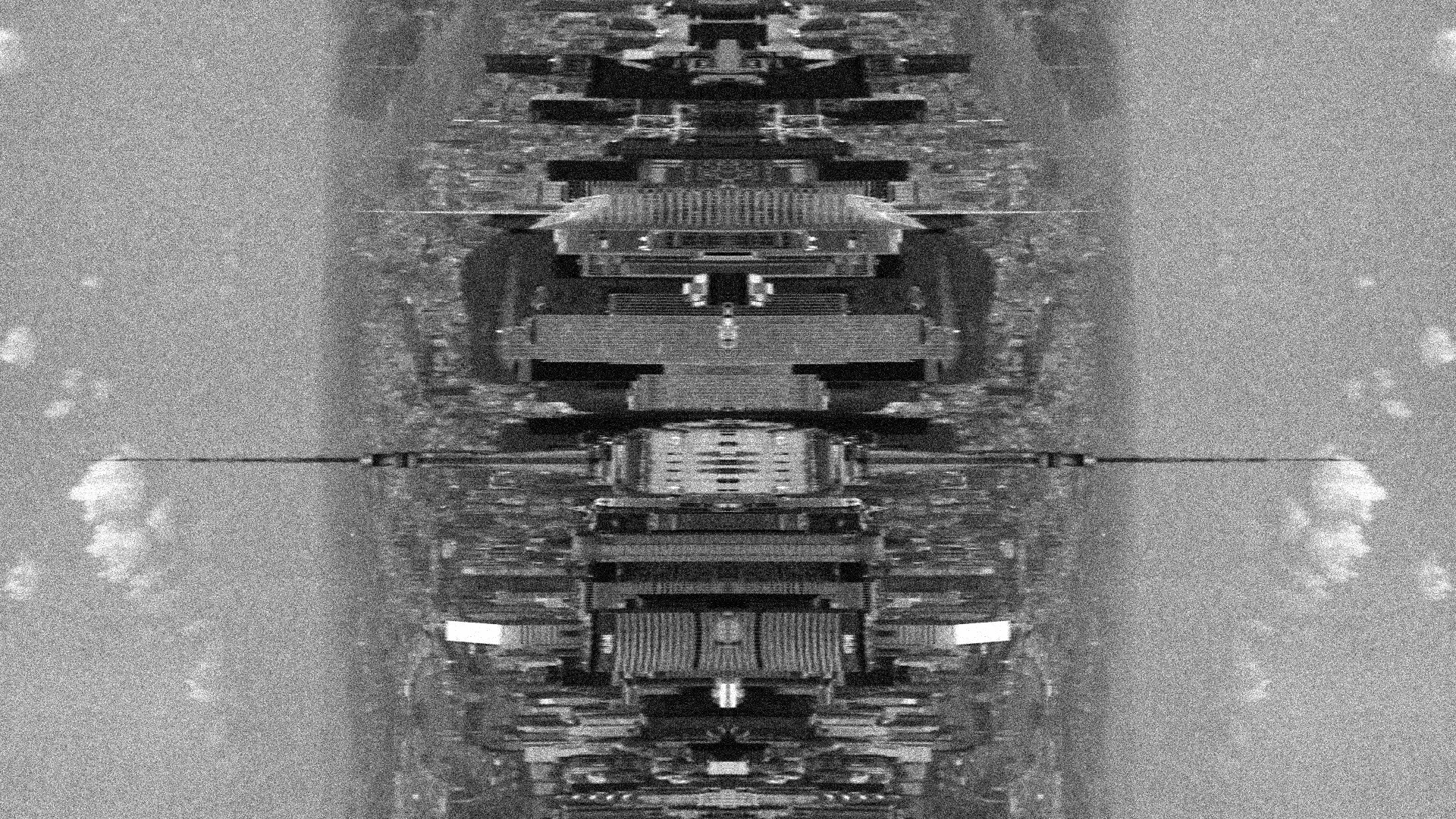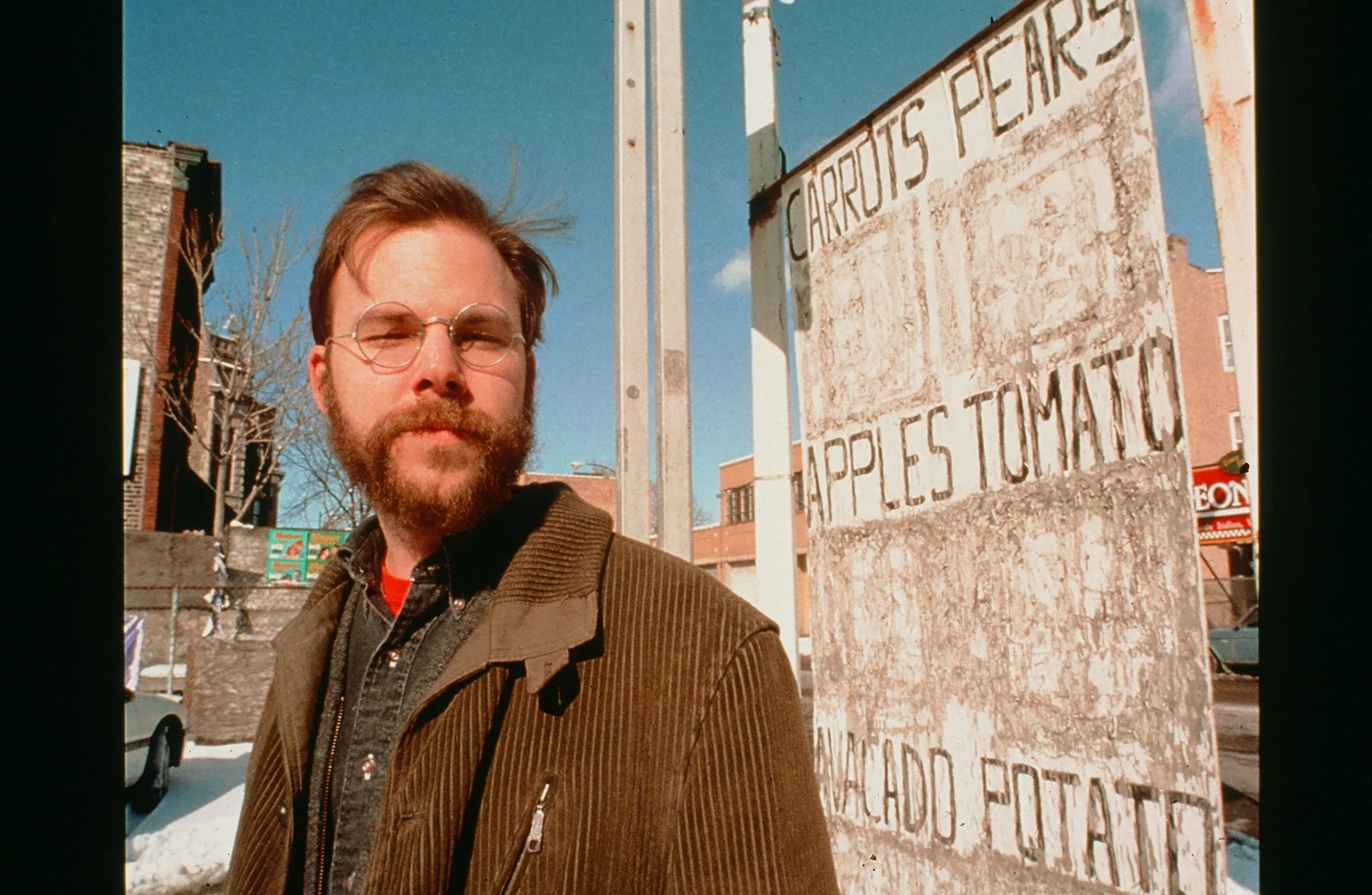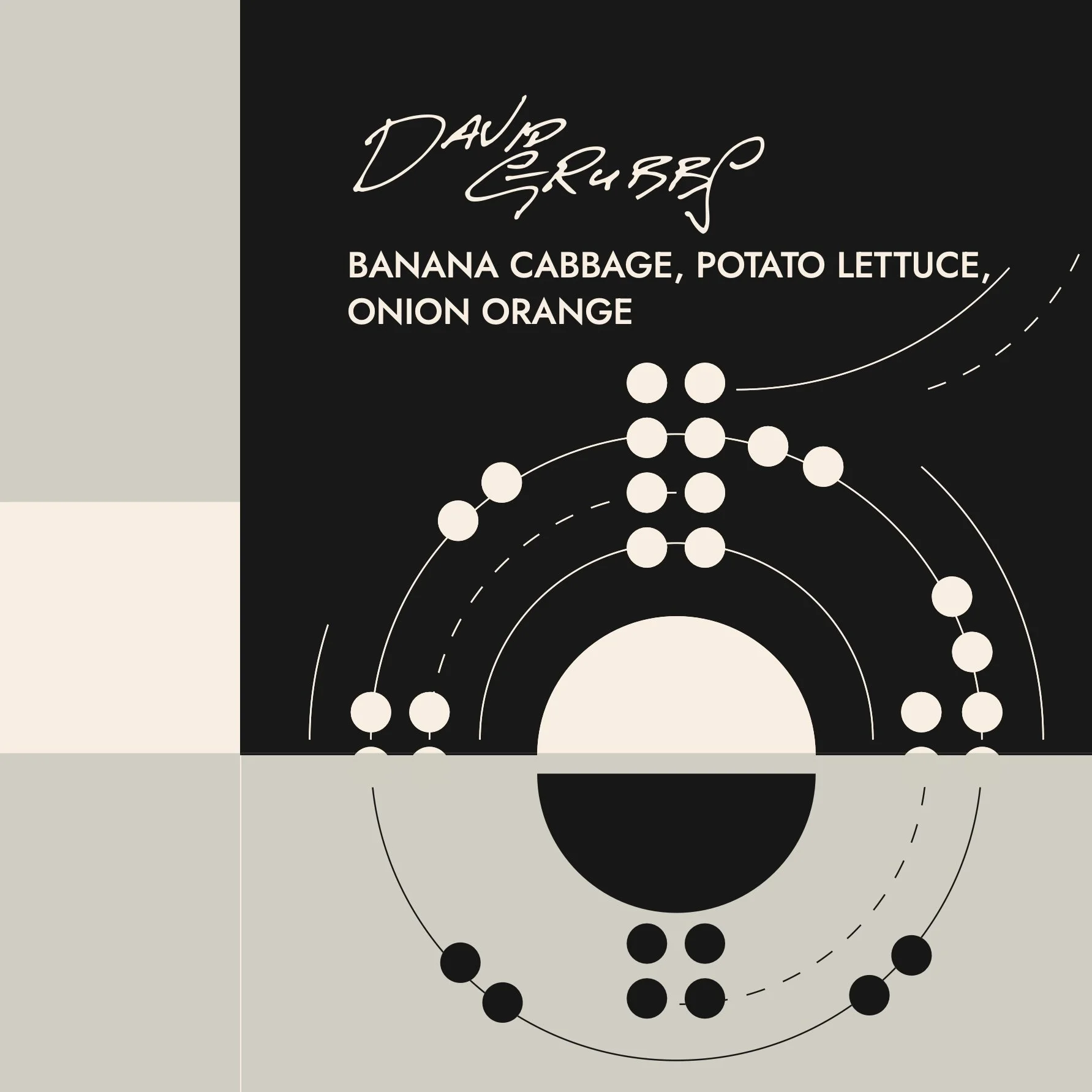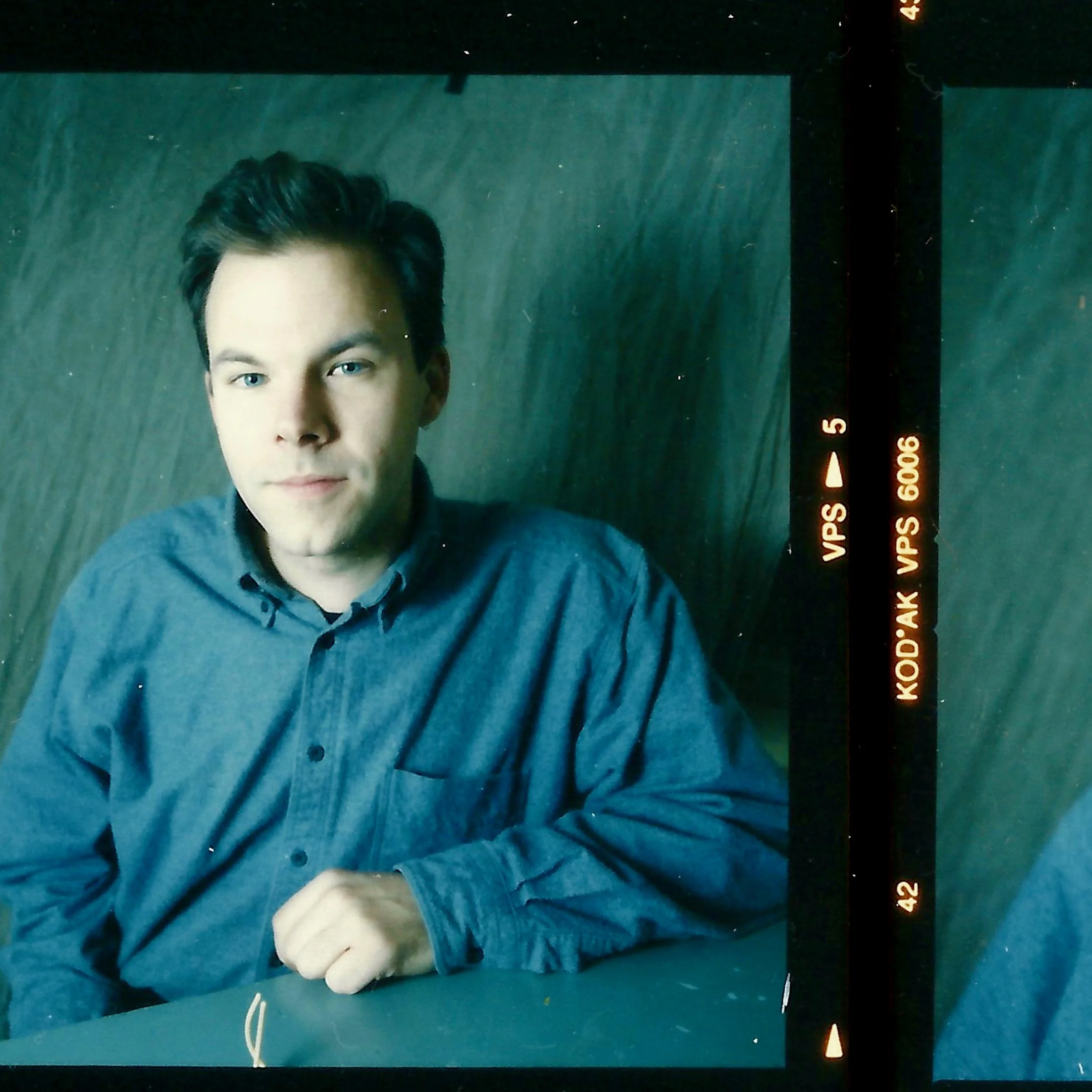David Grubbs
Banana Cabbage, Potato Letttuce, Onion Orange
Table of the Elements, 1996: For those with grit, it was a ride in the whirlwind. Behind was the Atlanta Manganese festival, a trailhead at which Tony Conrad initiated the greenhorns, an unknown Jim O’Rourke was introduced to Sonic Youth, and where Keiji Haino, Faust, and Dead C’s Michael Morley were first coaxed to tread American soil. Ahead was the Chicago Yttrium festival, a defiant, post-genre crossroads of 20th-century aural resolve. In between, Tony Conrad recorded, toured, and recorded again with Gastr del Sol; the label introduced O’Rourke to John Fahey, then Fahey to Loren Connors, and then reintroduced Fahey to the world—a flash in which all dizzying currents converged.
Serenely in the eye stood David Grubbs—observer, participant, and facilitator — and from that stance emerged his solo debut, Banana Cabbage, Potato Lettuce, Onion Orange (awarded “Best Title of 1997” by The Wire). The original tagline waggishly declared, “…in which a solo record = record of solos and less is not MOR.” True. At no hour does Grubbs traffic in noodly, middle-of-the-road equivocation. These are deliberate and thoughtful excursions, charted with mindful, patient authority and executed in a spirit of comradely challenge.
While comparisons to Morton Feldman were tolerable on release, present-day ears will discern a wry and roiling phraseology that flows from Squirrel Bait through a subsequent and vast creative output. Many of those works appear on Grubbs’s Blue Chopsticks label and its patron Drag City, which has also preserved several of his TotE recordings with Gastr del Sol. But it's Banana Cabbage, Potato Lettuce, and Onion Orange that christens the launch of Table of the Elements Archive, informing the nucleus of an inspiringly tempestuous past and an explosive, radiant future.
• • • • •
“If you wanted to, you could describe him as highly postmodern. Either way, he is one of the most adventurous, uncompromising and thoughtful figures on the experimental side of American composition.”
—The Quietus
• • • • •
Gastr del Sol
“Though their music began with two carefully intertwined acoustic guitars, it stretched to encompass orchestral fantasias, electronic abstraction and collage sensibilities imported from the avant-garde. Grubbs’s image-rich writing felt poetic and detached. In an era of plangent indie rock, they were the studied, intricate eccentrics.”
— Grayson Haver Currin, New York Times
David Grubbs
Banana Cabbage, Potato Lettuce, Onion Orange
1996/2025
Table of the Elements Archive
[Zinc] 30
EOE-030
Phono 12” LP, 180g vinyl, booklet
David Grubbs, Chicago 1996. Photo: Bettina Herzner
David Grubbs
“As much as any other musician to come along in the past ten or so years, Grubbs has pioneered new ground for pop music by combining inventive instrumentation and dynamics with cryptic, staggeringly intelligent lyrics and always-impeccable songwriting.”
— Pitchfork, on The Spectrum Between
“Grubbs’ playing is resplendent, and, when accented by the subtle buzz of electronics or the moan of a horn, it’s the material of transcendence. The man is clearly onto something here and those who have been faithful to his work since ‘Rebecca Sylvester’ or even more so, ‘Sun God’ will thrill at what he’s cooked up here. Five entirely sky-drowning stars!”
— Popdose, on Creep Mission
David Grubbs
"The danger of these collaborations across disciplines is in having too strict of a division of labor … when I make an album, I write music, I write lyrics, I come up with the visual design, etc. I get to do all of that stuff."
— David Grubbs, reflecting on his multi‑disciplinary creative control
"Grubbs carries this chill tone over into his solo releases to sometimes stunning results."
— Pitchfork, on The Spectrum Between
"Grubbs’ playing is resplendent, and, when accented by the subtle buzz of electronics or the moan of a horn, it’s the material of transcendence."
— PopDose, on Creep Mission
"This open, airy theme continues through even the most insular tracks … Grubbs’ compulsive poetic obfuscation makes for fine capital‑A Art…"
— Pitchfork, on An Optimist Notes the Dusk
Collaborative Projects
"Collaborating with the musician‑composer David Grubbs has brought vividly home to me how acoustic a seemingly collaged and visual work can be.”
— Susan Howe, on their Frolic Architecture project
"It feels like a bit of a stretch to call this a Grubbs solo album … Grubbs’ open‑ended and elliptical playing style gives his guest musicians generous room to operate."
— Pitchfork, on The Plain Where the Palace Stood
"Grubbs' resume … includes a catalog of collaborations that reads like a cross‑platform who’s‑who list."
— Pitchfork, on The Plain Where the Palace Stood
Gastr del Sol
“This is gonna sound weird, but we were fucking great.”
— Jim O’Rourke, Stereogum, 2018
Gastr del Sol We Have Dozens of Titles
(available here from our industrious friends at Drag City)
“Though their music began with two carefully intertwined acoustic guitars, it stretched to encompass orchestral fantasias, electronic abstraction and collage sensibilities imported from the avant-garde. Grubbs’s image-rich writing felt poetic and detached. In an era of plangent indie rock, they were the studied, intricate eccentrics.”
— Grayson Haver Currin, New York Times
"David Grubbs has been thinking about this release from the moment Gastr Del Sol ceased.”
— Uncut
"In a new archival collection, Jim O’Rourke and David Grubbs have polished and stitched together every scrap and forgotten rarity into one final album, a fitting final chapter for an indescribably great band"
— Pitchfork
"Grubbs and O’Rourke shine a light on those obscure songs and oddities… it captures how this duo could feel so alive and unpredictable"
— Pitchfork
"The live version of ‘The Seasons Reverse’ features dense guitar work spiraling… Grubbs’ strings is as big as exploding fireworks"
— Pitchfork
"This box set is the fascinating story of Jim O’Rourke and David Grubbs’s short-lived but influential avant-garde duo"
— Uncut
"Listening to Gastr Del Sol’s music is like trying to grasp smoke"
— Pitchfork
"From 1991 to 1998, Gastr del Sol existed creating music that pulled and pushed at the supposed rules of music making… the musical family tree continues to carve itself into the souls of music lovers"
— The Quietus
"Their work maps the space between John Cage and John Fahey… thrillingly true to form"
— The Washington Post
"In the ’90s, Gastr del Sol’s music refused to fit in any box. A fantastic new album of unreleased tracks sounds true to form"
— The Washington Post
"Gastr del Sol left an indelible mark on post-rock and beyond. Not only were they at the dead center of Chicago's sprawling, influential scene…"
— Boomkat
"They drew on Derek Bailey-style improv, jazz, and musique concrète—unlike their ‘polite’ peers"
— Boomkat
[BIO]
DAVID GRUBBS has released fifteen solo albums and appeared on over 200 commercial releases. He is the author of Good night the pleasure was ours, The Voice in the Headphones, Now that the audience is assembled, and Records Ruin the Landscape: John Cage, the Sixties, and Sound Recording (all published by Duke University Press) as well as the collaborative artists’ books Simultaneous Soloists (with Anthony McCall, Pioneer Works Press) and Projectile (with Reto Geiser and John Sparagana, Drag City). His ongoing collaborations include projects with visual artists Anthony McCall and Angela Bulloch and poet Susan Howe. Grubbs was a member of the groups Gastr del Sol, Bastro, and Squirrel Bait, and has performed with Tony Conrad, Pauline Oliveros, Luc Ferrari, Will Oldham, Loren Connors, the Red Krayola, and many others. He is a recipient of the Berlin Prize and a Grants to Artists award from the Foundation for Contemporary Arts, and directs the Blue Chopsticks record label.





